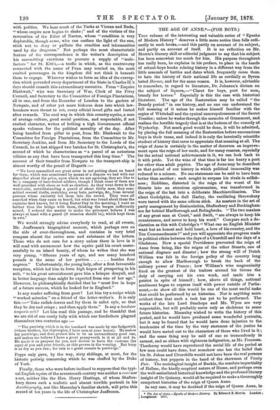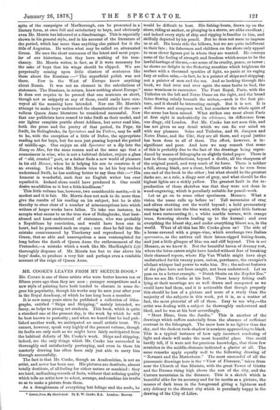THE AGE OF ANNE.*—(FOR BOYS.)
THIS volume of the interesting and valuable series of "Epochs of Modern History" deserves a little more notice than falls ordi- narily to such books,—and this partly on account of its subject,. and partly on account of itself. It is no reflection on Mr.. Morris's literary skill or editorial judgment to say that his subject, has been somewhat too much for him. His purpose throughout has really been, he explains in his preface, to place in the hands of school-boys books relating history in a different way from the little manuals of battles and dates which frequently cause them, to hate the history of their national life as cordially as Byron- hated Horace, and for the same reason. It is, however, advisable to remember, in regard to literature, Dr. Johnson's dictum on the subject of liquors,—" Claret for boys, port for men, brandy for heroes." Especially is this the case with historical literature. The age of the Restoration may be called "the Brandy period" in our history, and no one can understand the full meaning of it unless he makes himself familiar with the orgies of Whitehall and the cynical unscrupulousness of the Secret Treaties ; unless he wades through the memoirs of Grammont, and realises the horrible tragedy that is at the bottom of the comedy of Wycherley. Not much good would be done, it will be admitted, by placing the full meaning of the Restoration before unconscious. boys in their teens, and indeed it is only the heroically scientific student of history that cares to appreciate that meaning at all. The reign of Anne is certainly in the matter of decorum an improve- ment upon the reign of her uncle, and for many reasons, especially for the actual national achievements in it, we can look back to- it with pride. Yet the wine of that time is far too heavy a port. for other than adult peptics. The age of Anne may be described. as that period of our history in which political immorality was reduced to a science. No one statesman can be said to have been. better than another ; each sought to surpass his rivals in selfish- ness; Hobbism, distorted in the reign of the worst of the- Stuarts into an atrocious epicureanism, was transformed in the reign of the last into a deliberate Macchiavellianism. The silent Godolphin, the dull Harley, the vacillating Shrewsbury were tarred with the same odious stick. As masters in the art of party management by dissimulation, Shaftesbury and Buckingham are far behind Marlborough and Bolingbroke. "The two maxims- of any great man at Court," said Swift, "are always to keep his countenance, and never to keep his word." Compare such a de- claration as this with Coleridge's "What can an English Minister- want but an honest and bold heart, a love of his country, and the Ten Commandments ?" and you will appreciate the progress made in political ethics between the days of a Churchill and the days of a Gladstone. How a special Providence prevented the reign of Anne from being, like the reigns of the other Stuarts, one of national disgrace and disaster ; how the strong will of Dutch William was felt in the foreign policy of the country long enough to allow Marlborough to break the back of the military power of France ; how William's wise magnanimity fixed on the greatest of the traitors around his throne the duty of carrying out his own work, and made him a patriot in spite of himself ; how, above all things, national sentiment began to express itself with power outside of Parlia- ment,—to show all this would be one of the most useful tasks. that could be performed by an historian. Nor is anything more- evident than that such a task has yet to be performed. The works of the late Lord Stanhope and Mr. Wyon are very respectable, but will probably serve only as skeletons to some future historian. Macaulay wished to write the history of this- period, and he would have produced some wonderful portraits,. but it may be feared that he would have done injustice to the tendencies of the time by the very sternness of the justice he would have meted out to the characters of those who lived in it ; and the same thing may be said of one so tremendously in earnest, and so ablaze with righteous indignation, as Mr. Freeman. Thackeray would have reproduced the social life of the period as few men could have done, but somehow one has the belief that his St. Johns and Churchills would not have been the real persons of history, but puppets in the hand of the showman of Vanity Fair. The sociological insight of Buckle, the resolute impartiality of Hallam, the kindly sceptical nature of Hume, and perhaps even the well-assimilated historical knowledge and the profound literary insight of De Quincey, would all be required to make a throroughly competent historian of the reign of Queen Anne.
In any case, it may be doubted if the reign of Queen Anne, in • The Age of Anne,—Epochs of Modern Rialory. By Edward B. Morris. London Longman& 1877.
spite of the campaigns of Marlborough, can be presented in a literary form, at once full and satisfactory to boys, and obviously even Mr. Morris has laboured at a disadvantage. This is especially shown in his general style, and in his account of the literature of the period, which has more than anything else gained for it the title of Augustan. He writes what may be called an attenuated Green. He uses the short sentences of the latest and most popu- lar of our historians, but they have nothing of his tren- chancy. Mr. Morris writes, in fact, as if it were necessary for the sake of boys that his wings should be clipped. We are perpetually coming upon little clusters of sentences like these about the Russians :—" The superficial polish was not
there. Few in the West of Europe know anything about Russia. It was not an element in the calculations of statesmen. The Russians, in return, knew nothing about Europe." It does not require to be proved that one sentence as short, though not as snippety as any of these, could easily have con- veyed all the meaning here intended. Nor can Mr. Morris's attempt to make boys understand the characteristics of the mar- vellous Queen Anne literature be considered successful. Now that our publicists have ceased to take Swift as their model, and our lighter essayists prattle about Addison, but never read him, both the prose and the poetry of that period, its Pope, its Swift, its Bolingbroke, its Spectators and its Toilers, may be salt to be, with the exception of a little of Defoe, the appropriate reading not for boys, but for men just passing beyond the period of middle-age. One enjoys an old Spectator or a dip into the Essay on Man, for the same reason and at the same age that a connoisseur in wine, who is not a habitual drinker, enjoys a glass of "old, crusted" port, or a father finds a new world of pleasure in his old Horace, when he is helping his son to construe it of an evening. Yet when Mr. Morris tries to let his boy readers understand Swift, he has nothing better to say than this :—" His humour is wonderful, such that no English writer has ever equalled it. Ireland alone could have produced it. One could desire no addition to it but a little kindliness."
This little volume has, however, two considerable merits,—it is modest and it is fair. Mr. Morris does not seek to do more than give the results of his reading on his subject, but he is able thereby to steer clear of a number of misconceptions into which writers of larger works have fallen. To take one instance, he accepts what seems to us the true view of Bolingbroke, that best- abused and least-understood of statesmen, who was probably a Republican by conviction, and would have been one in heart, had he possessed such an organ ; nor does he fall into the mistake countenanced by Thackeray and reproduced by Mr. Green, that so able and unscrupulous a man contemplated for long before the death of Queen Anne the enthronement of the Pretender,—a mistake which a work like Mr. MacKnight's Life thoroughly disposes of. Mr. Morris has but to rise above his boys' desks, to produce a very fair and perhaps even a readable account of the reign of Queen Anne.



































 Previous page
Previous page